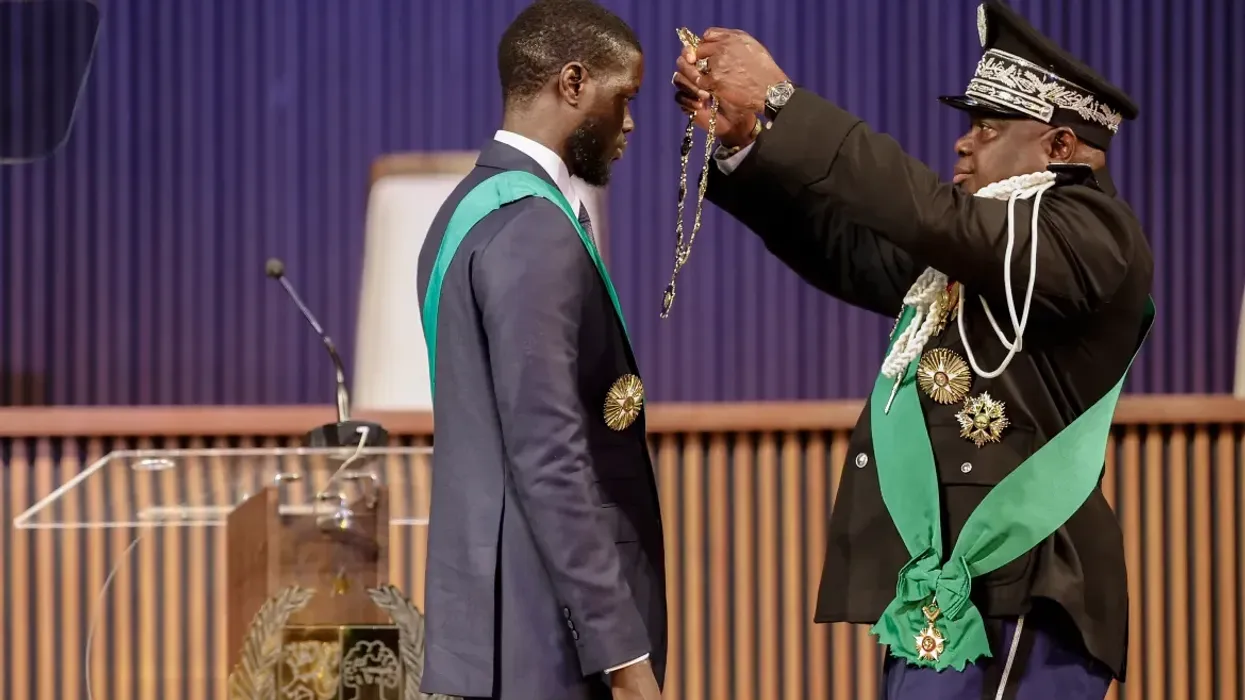Bassirou Diomaye Faye, a progressive advocate for pan-African unity, took the presidential oath on Tuesday, becoming Senegal’s youngest leader following a landslide victory in the initial ballot, just 10 days after his release from incarceration. He has promised sweeping changes with this responsibility.
With no previous elected positions under his belt, the 44-year-old attracted the presence of numerous African heads of state at the ceremonial event held in the nascent hub of Diamniadio, situated near Senegal’s capital city, Dakar.
“Before God and the Senegalese nation, I swear to faithfully fulfil the office of President of the Republic of Senegal,” Faye said before the gathered officials.
He also vowed to “scrupulously observe the provisions of the Constitution and the laws” and to defend “the integrity of the territory and national independence, and to spare no effort to achieve African unity”.
The official transfer of authority from outgoing President Macky Sall to the newly-elected leader will occur at the presidential palace in the heart of Dakar.
Faye was part of a cohort of political adversaries released from incarceration just 10 days prior to the March 24 presidential election, following an amnesty decree issued by Sall, who had attempted to postpone the electoral process.
Faye kicked off his campaign from behind bars, which has shown his resilience and determination in the face of adversity.
Transitioning from his role as a tax inspector, the new president assumes the mantle as the fifth leader of the West African nation since its breakaway from France in 1960, notably becoming the first to openly declare his polygamous union.
Teaming up with his populist guide Ousmane Sonko, who was ineligible to run in the election, Faye articulated their shared goals during his celebratory speech: promoting unity among the nation, addressing the challenges of rising living expenses, and battling against corruption.
The leader, known for his anti-establishment stance, has pledged to reclaim national control over crucial sectors like oil, gas, and fishing, emphasizing the importance of restoring sovereignty.
Faye seeks to distance the nation from the regional CFA franc, perceiving it as a vestige of French colonial rule, while prioritizing investments in agriculture to attain food self-reliance.
But he has also sought to reassure investors that Senegal “will remain a friendly country and a sure and reliable ally for any partner that engages with us in virtuous, respectful and mutually productive cooperation.”
After three tense years and deadly unrest in the traditionally stable nation, his democratic victory was hailed from Washington to Paris, via the African Union and the European Union.
US Secretary of State Antony Blinken on Monday spoke with the president-elect by telephone and “underscored the United States’ strong interest in deepening the partnership” between their two countries, the State Department said.
Read also: Senegal’s Top Court Affirm Faye’s Presidential Poll Victory
On the international stage, Faye seeks to bring military-run Burkina Faso, Mali and Niger back into the fold of the regional Economic Community of West African States (ECOWAS) bloc.
Known colloquially as Diomaye, a moniker signifying “the honorable one” in the native Serer tongue, he emerged victorious in the election with 54.3 percent of the ballots cast.
The resurgence was remarkable considering the government’s dissolution of the Pastef party, co-founded by Faye and Sonko in 2014, with Sall delaying the election.
Faye, an observant follower of Islam originating from humble beginnings, balancing life with two wives and four children, symbolizes a new breed of youthful politicians.
He has openly admired the former US President Barack Obama and the South African anti-apartheid hero Nelson Mandela. However, both Faye and the government he is expected to reveal will rapidly face major challenges.
With no majority in the National Assembly, he will need to cultivate alliances to enact new legislation or contemplate the possibility of calling for a legislative election, which becomes a feasible alternative from mid-November.
The most pressing challenge will be generating sufficient employment opportunities in a country where 75 percent of the 18-million population is under the age of 35, and the official unemployment rate stands at 20 percent.
Numerous youths have regarded the future as incredibly bleak, leading them to undertake perilous journeys to join the waves of migrants attempting to reach Europe.
Meanwhile, Sall has been appointed as the special envoy of the Paris Pact for People and Planet, an initiative crafted to address poverty, safeguard the environment, and aid vulnerable nations.

